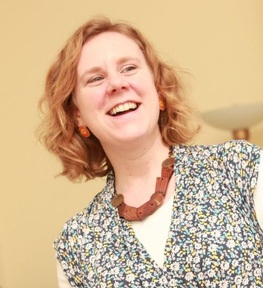NHS prescribes comedy courses to help people with 'mental health,' addiction and 'trauma'
A comedian has developed a new wellbeing project which involves laughter being prescribed to patients to help them "recover" from mental health issues and "traumas".

Comedian in residence at Bristol University and lecturer in comedy at Worcester University, Angie Belcher has been working with NHS social prescribers and health advisors in Bristol to provide a free six week wellbeing course called Comedy on Referral available through Bristol Wellspring Settlement Social Prescribing Team.
Participants who sign up for the free six week course are from all walks of life including people experiencing anxiety and depression, recovering alcoholics and drug addicts as well as those who suffer from PTSD. By the end of the course, it’s hoped participants will be able to perform five minutes of stand-up based on their own life.
Ms Belcher told homecare.co.uk: “I wanted some time to find out whether the process of stand-up comedy would help people recover from trauma and thankfully, the Arts Council thought it was an awesome idea.
“The course I am delivering is all about the process of learning stand up comedy. It’s not about putting you in front of an audience. It's about needing time to build a relationship with the people who come along.
“It’s getting people to have confidence in their experience of the world and their humanity is important and it just so happens I can help you to make your experience sound really funny as well.
“The course is built on confidence building which in turn creates transferable skills for people to prepare them for interviews, presenting and networking skills.
“It's exactly the same process as learning to be a stand up comedian.”
'Wouldn’t it be great to see if this had any therapeutic benefits in the community'
Social prescribing is a means of enabling GPs, nurses and other health and care professionals to refer people to a range of local, non-clinical services.
Schemes delivering social prescribing can involve a range of activities that are typically provided by voluntary and community sector organisations. Examples include volunteering, arts activities, group learning, gardening, befriending, cookery, healthy eating advice and a range of sports.
The Comedy on Referral course takes people through the steps needed to create a five-minute comedy set. This includes exploration of the person’s stand-up comedy persona and how it relates to their real self, understanding of how to use a situation, thought or belief as a starting block for writing comedy, how to use the body, voice and breath to bring the story to an audience and how to use comedic devices to make stories funny.
Ms Belcher taught two sessions of the course to the Bristol social prescribers so they had an understanding of what the course entailed and could sell it to their patients.
“I had to take things a whole lot more slowly than I normally do. They needed lots of games to get them to gel together as a group and trust me and each other.
“We have to find out what is funny and how to bring out the funny bits to their life. They need to find their safe space where they can talk about things."
Ms Belcher has been a comedian for around 10-12 years and it was while lecturing students that she noticed comedy could help those to overcome fears about being on stage.
“The [students] loved the process of involving themselves in writing, they bonded as a team and it was just a lovely transformation and I just thought wouldn’t it be great to see if this had any therapeutic benefits in the community."
'We help men to write down their thoughts and feelings, then approach it from a comedy point of view'
Ms Belcher is now taking her Comedy on Referral course to Cardiff, Bath, Brighton and will be delivering a course in London specifically for men at risk of suicide.
According to the Samaritans website, since the mid-1990s, men have accounted for three quarters of registered suicide deaths in the UK as a whole.
It has also been found that men aged 45 to 49 years have the highest age-specific suicide rate (25.5 deaths per 100,000 males).

Ms Belcher says that in older men, "they don’t talk about their feelings. A lot of men don’t have the same expressive approach to their problems.
“We help men to write down their thoughts and feelings, then approach it from a comedy point of view. Get them to think about how things that can happen can be seen comedically.
"It’s never a question of me thinking that is funny but it is more in their trauma and their histories.
“We now bring up men where we now say right let’s talk about it to encourage people to share their problems in the hope that they are not seen as bad, and it makes you think that you are in a community with other people where you know you are not alone.
“The important thing is sharing it and talking about it and dealing with it.”
Before Ms Belcher became a professional stand up comedian, her career included working as a creative manager for a disability arts company and has worked with young offenders. “I always worked with those who always had a rough deal in life, who had trauma in their life and has come from bad upbringings who struggled with drugs and that was really important to me. I just notice that comedy helps those who do struggle with life.”
“Like all art therapy, the focus is on the art form – and the process is that by concentrating on the art form, the things get worked out.”
Latest News
 29-Jul-24
Dementia Bus gives carehome.co.uk staff insight into life with dementia
29-Jul-24
Dementia Bus gives carehome.co.uk staff insight into life with dementia
 27-Jul-23
UK's top home care agencies in 2023 revealed
27-Jul-23
UK's top home care agencies in 2023 revealed
 30-Nov-22
A quarter of older people keep their falls secret from family
30-Nov-22
A quarter of older people keep their falls secret from family
 29-Nov-22
'Covid-19 has not gone away' say terminally ill
29-Nov-22
'Covid-19 has not gone away' say terminally ill
 28-Nov-22
IT consultant who received poor care opens 'compassionate' home care business
28-Nov-22
IT consultant who received poor care opens 'compassionate' home care business